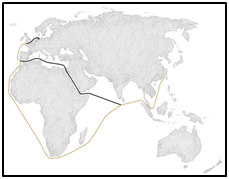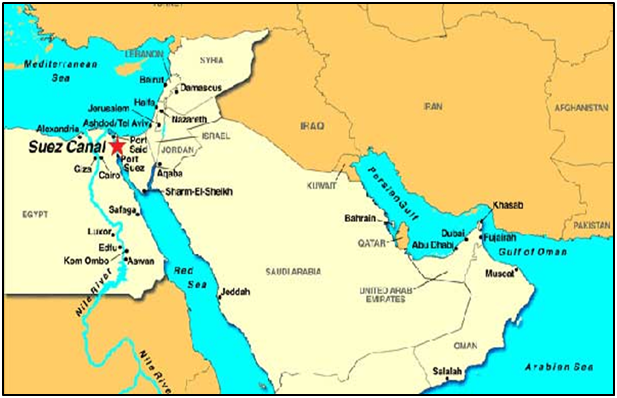What’s in Today’s Article?
- Background (Context of the Article)
- About Suez Canal (History, Route, etc.)
- About UNCTAD (Objective, HQ, Members, etc.)
- How Trade Disruptions Affect Global Temperatures
Background:

- As Houthi militants are attacking commercial ships passing through the Red Sea, there is a crisis-like situation as these ships have to take longer routes.
- Since the attacks by Yemen’s Houthi rebel forces began in the Suez Canal last year in October, hundreds of ships have been diverted around the Cape of Good Hope.
- This takes about 10 to 15 days of voyage time resulting in higher emission.
- For example, a large container ship’s journey from China to Germany, for example, emits 38 per cent more carbon dioxide, or 4.32 million kilograms, if it goes around Africa instead of through the Suez Canal
- The United Nations Trade and Development (UNCTAD) has said that global trade disruptions are causing ships to spend more days at sea causing a surge in the emission of greenhouse gases.
About Suez Canal:

- It is an artificial sea-level waterway in Egypt. It was built in 1869
- It connects the Mediterranean Sea to the Red Sea through the Isthmus of Suez.
- It provides shortest sea link between Asia and Europe by avoiding the South Atlantic and southern Indian oceans and reducing distance from the Arabian Sea to London by 8,900 kilometers.
- The canal was nationalized by Egypt in 1956 after brief war against the UK, France and Israel.
About United nations Conference on Trade & Development (UNCTAD):
- UNCTAD is a permanent inter-governmental body established by the United Nations General Assembly in 1964.
- It is responsible for dealing with development issues, particularly international trade.
- Framing policies in various domains such as trade, technology, finance, aid, and transport are the most important priorities of UNCTAD.
- The Conference ordinarily meets once in four years.
- The second UNCTAD Conference took place in New Delhi, India in 1968.
- Members: 195 countries; Headquarters: Geneva, Switzerland
How Trade Disruptions Contribute to Rising Temperatures?
- Each metal container aboard a commercial ship can also be tracked individually as they travel to their destinations.
- The container tracking allows the companies that are buying or selling the goods to then calculate the carbon footprint of their supply chain and distribution – a key step for reducing their emissions.
- Reuters, a media organisation, analyzed tracking data for more than 6,000 rerouted containers shipped between Dec. 15, 2023 and March 31, 2024.
- On average, each container traveling on its original route is associated with around 1.07 tons of CO2 released.
- However, data from the rerouted shipments shows they actually emitted on average 1.35 tons of carbon dioxide per container. That’s 0.28 tons more for each container.
- By the first half of February 2024, 586 container vessels had been rerouted, while container tonnage crossing the canal fell by 82 per cent as per the UNCTAD.
- The UNCTAD said that for the first time, the world faces simultaneous disruptions in two major global maritime trade waterways, with far-reaching implications for inflation and food and energy security.
- Since October 2023, there have been more attacks on ships in the Red Sea.
- These attacks are adding to problems already happening in the Black Sea because of the war between Ukraine &Russia, and in the Panama Canal because of droughts caused by climate change.









